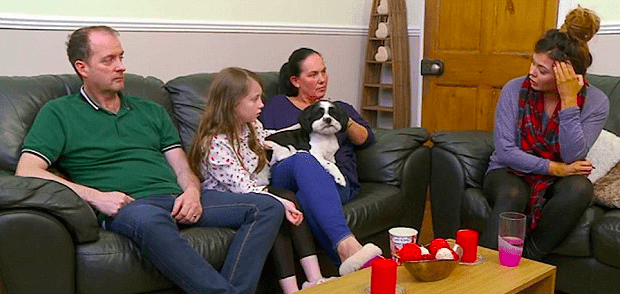Gogglebox and ex I’m a Celeb star Scarlett Moffatt’s controversial new documentary The British Tribe Next Door aired this week. In this ‘social experiment’ from Channel 4, the Gogglebox family spend a month living in Namibia among the Himba tribe.
At the beginning of the show, there’s considerable hope that the experience will teach the Moffatts a lesson in first-world privileges and materialism. Sitting in her family home in Bishop Auckland, eldest daughter Scarlett wonders where she will find enough toilet roll to last her a month in remote Nambia. She reflects with a self-aware and mindful comment:
‘I feel like here in England we’re in a very privileged position, where anything we want is right at our fingertips if we wish. So for food, we just pop to the shops and we have fresh running water, a microwave, a grill, a kettle.’
Yet, it would seem Scarlett, who genuinely questions her mother if they will have to make their own toilet paper, hasn’t actually read the details of her contract for the documentary.
For, despite living amongst the indigenous Himba tribe, Channel 4 does not strip away any of Scarlett’s first-world privileges. In fact, among the 18 mud-stone huts of the natives, an exact replica of their own family home in County Durham is built for them to live in, complete with running water, electricity and Wi-Fi.
Oh, and not forgetting over 20,000 of their family possessions.
Scarlett Moffatt’s The British Tribe Next Door: what were the TV execs thinking? https://t.co/0r7VQf7Ab4
— The Guardian (@guardian) October 19, 2019
You would have thought the commissioners of the programme might have seen this relocation of their family home as largely inappropriate, underlining a clear-cut divide between ‘them and us’. Apparently not, as the voice-over explains,
‘The villagers will be able to watch them live their lives just as they do back home’.
Indeed, as one family of 11 share out a thick mush of porridge between them for breakfast in their mud-stone hut, the Moffatts deliberate whether or not they would like a third piece of toast. Another scene shows Scarlett’s mother, Betty, carelessly leaving the tap on as she does the dishes whilst a pair of women from the tribe walk for miles before digging holes deep into the ground in order to collect water.
But, of course, we needn’t worry as the voice over reassures that the Moffatt family have had their water trucked in ‘not to take from the villagers’ – how very thoughtful of the producers.

The Moffatt family are best known for appearances on hit reality series Gogglebox. Photo credit: Daily Mail
The villagers are welcomed into the Moffatt’s mock-up home, and are shown to be in awe of many of the family’s personal items. The women are particularly astonished by Scarlett’s vast collect of shoes and the excessive number of cushions scattered across her double bed. ‘Why do you need so many things for one person’ one of the women asks, adding that they only own one large stone each to rest their head on at night.
Whilst the Himba women question Scarlett’s make-up usage and unnaturally white teeth, the men of the tribe seem less impressed. They mock her father Mark’s prized possession that is his metal detector and question why the family didn’t bring the tribe any livestock as a token of their gratitude.
As Ellie Harrison of The independent writes,
’Much of the programme gawps at the foreignness of the Himba tribe and seems to boil the entire content of Africa down to a single, stereotyped, one-dimensional image.’
It is stiking that, in this first episode, we never see the Moffatt family eat any of the natives’ meals. Scarlett is at first persuaded, however, to wear the tribal traditional dress but is quickly put off the idea when she realises she must bare her breasts in public.
The most profound statement of the whole show comes when the Himba women refuse to let Scarlett wear her jumpsuit underneath the topless dress. One of the women explains,
‘You can’t mix cultures like that…it isn’t good’.
I just wish this had been the attitude of the show’s commissioners.
Featured Image: David Bloomer/The Telegraph
